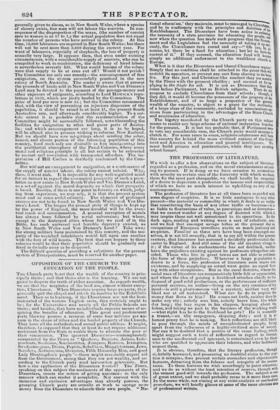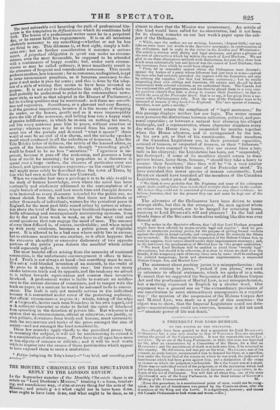THE PROFESSION OF LITERATURE.
WE WiSil to offer a few observations on the subject of literature regarded as a profession, and on the moral circumstances attend- ing its pursuit. If in doing so we have occasion to animadvert with severity on certain sins of the fraternity with which wedeem them for the most part chargeable, we shall hardly be suspected of a desire to depreciate a profession the honour and respectability of which we have as much interest in upholding as any of our contemporaries.
The profession of literature has at all times been regarded with some degree of suspicion. It is so little analogous to any other pursuit—the material or commodity in which it deals is so unlike that constituting the basis of any other traffic or business—it is so liable to fluctuations of value, so precarious and so deceptive— that we cannot wonder at any degree of distrust with which it may inspire those not well accustomed to its operations. In the dark ages, reading and writing were a sort of cabalistic arts; and we find that amongst savage tribes at the present day no occupations of European travellers excite so much jealousy and suspicion. Familiar as these arts have long been amongst our- selves, it is not till recently, that is to say till within the present century, that literature has assumed a decidedly professional cha- racter in England. And still some of the old mystery clings to it ; if the virtue of its enchantments has not declined, neither have the prejudices existing against its professors altogether sub- sided. Those who live in great towns are not able to estimate the force of these prejudices. Wherever a large population is drawn to a focus, the profession of literature soon starts into existence, and by supplying an actual want gains an equal foot- ing with other occupations. But in the rural districts, where the social uses of literature are comparatively little felt or appreciated, and where the idea of gaining a livelihood attaches chiefly to the disposal of good solid productions, or the performance of sufficient personal services, an author—living on the airy creations dins mind—is still a plicenomenon soul to mystery, neither very well liked nor at all understood. What car Inc do to acquire the money that flows to him ? He comes not forth, neither does he make any stir ; nobody sees him, nobody hears him, the whole day long ; the lazy rogue in his slippers, hanging about the house, and taking no part in the business of the working world —what right has he to the livelihood lie gets ? Ile is assuredly a truant,—an idle scapegrace, skipping duty ; and it is no honest penny that lie is making. Such reflections are still likely to pass through the minds of unsophisticated people, living apart from the influences of a highly-civilized state of society. Nor can it be doubted that a portion of the same feeling, which might suggest such a train of reflections in regard to literary men to the uneducated and ignorant, is entertained even by those who are qualified to appreciate their labours, and who habitually respect them.
It is obvious, therefore, that the literary profession, though. rishtfully honoured, and possessing no doubtful claim to the posi-
tion it occupies, does present certain anomalies and objectionable features, detracting from the fulness and integrity of its preten- sions. To these features we wish accordingly to point attention; and we do so without the least intention of reserve, though with the utmost good-will towards the profession. The subject 10 000 of great extent, and we shall probably recur to it more than once. In the mean while, not aiming at any strict analysis or methodical procedure, we will briefly glance at some of the more obvious sUli of professional writers.
The most noticeable evil besetting the path of professional lite- eiture is the temptation to elYrusiversess which its conditions hold forth. The brains of a professional writer must be in a perpetual tee or he cannot fulfil his engagements. It is on all occasions absolutely necessary to say something—whether or not be has ,fly thing to say. This dilemma i3, at first sight, simply a Judi- duos ore; but on further consideration it assumes a serious
opeCh —
A perpetual obligation to speak can under no circum- stances, even the most favourable, be supposed to be attended with a continuance of happy results; but, under such circum- stances as may be called ordinary, it must manifestly result in the utterance of frequent and considerable nonsense. This result produces another, less innocent ; for as nonsense, undisguised, is apt to incur inconvenient penalties, so it becomes necessary to dis- guise it and make it pass for sense; and this t3 done by the adop- tion of a style of writing that seems to have been invented on purpose. It is not easy to characterize this style, (by which we shall probably be understood to point to the commonplace news- paper style, as well as that adopted in the Houses of Parliament,) but its leading qualities may be mentioned : and these are smooth- ness and vagueness. Smoothness, or a pleasant and easy fluency, is of the greatest importance, because it is the means of dropping the reader, or the hearer, gently and as it were imperceptibly down the tide of the nonsense, and lulling him into a happy state of passive indifference, in which he insists on nothing too much, and lets every sentence pass him in peace, without exaction or scrutiny ; whereas were lie so far roused from his siesta as to arrest one of the periods and demand "what it meant ?" there would at once be an end of tl.e charm, and the unlucky speaker would stand confessed in all the nakedness of nonsense. Like Sit- Toby Belcli's letter of defiance, the article of the learned editor, or speech of the honourable member, though "exceeding good," would be found to be no less " senseless." Vagueness is im- portant, because it puts off the reckoning, and procures a long term of credit for meaning ; for in proportion as a discourse is spread over a large surface, the chances of particular error are reduced, and ignoiance escapes exposure,—as the county of Corn- wall might more safely be described than the town of Truro, by him who had seen neither Truro nor Cornwall.
When we consider how rare a privilege it is to be able to add to the stock of human knowledge, even where the mind has been continually and studiously addressed to the contemplation of a single branch of science, and how much time and thought deserve to be bestowed on every discourse intended for the public ear, we almost shrink from the reflection that there are hundreds or rather thousands of individuals, writers for the periodical press in England, for the most part little raised either by nature or educa- tion above the level of the mass, whose livelihood depends on their boldly advancing and unscrupulously maintaining opinions, from day to day and from week to week, on all the most vital and sacred questions that can engage the mind of man. The amount of error thus diffused is, of course, incalculable; and when mixed up with party virulence, becomes a public poison of frightful power. It is allowed to be a bad case where safety lies in excess; but as extremes neutralize one another, so it often happens that the excessive absurdity or excessive dishonesty of two opposite portions of the public press defeats the mischief which either would separately inflict.
The most baneful effect arising from the necessity of continual tomposition, is the unfortunate encouragement it offers to false- load. Truth is not always at hand—but something must be said. TI e acne' cold-blooded invention of an untruth, to the credit of ths press be it spoken, is certainly rare ; but there are many shades between truth and its opposite, awl the tendency we advert to is rather towards equivocation and evasion than inventive falsehood. A professional writer is liable to contract an indiffer- ence to the sterner dictates of conscience, and to tamper with the truth on paper, in a manner he would be ashamed to do in conver- sation. The fault is only not morally serious in the individual because it is committed under cover of the protecting sophistry, that official circumstances require it ; which, taking off the edge of a &reproach, leaves each man blameless in his own regard, and writ sufficient character at stake to forbid the spirit of falsehood from spreading in the direction of private life. But whoever is of Opinion that no circumstances, official or otherwise, can justify, or even palliate, deviations from truth and honour, must necessarily rank the macceuvres and tricks of the press amongst the sins of society—and not amongst the least considerable.
These few remarks apply chiefly to the periodical press ; but, in resuming the subject, it will not be uninteresting to extend it to a consideration of other cases. Poets have in all ages beets more or less objects of censure or ridicule ; and it will be well worth While to inquire into the causes of those peculiarities which appear to have exposed them to such a misfortune.
• Fabian (eulogizing Sir Toby's letter)—" Very brief, and exceeding good senseless l"



























 Previous page
Previous page